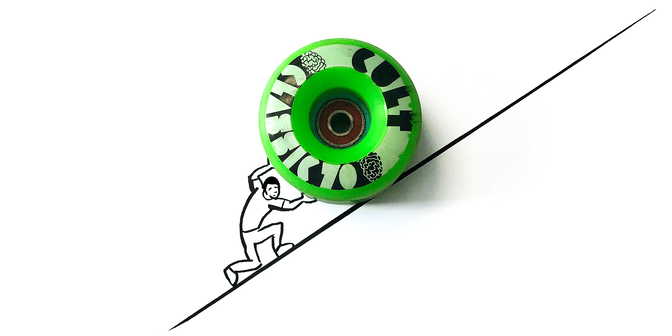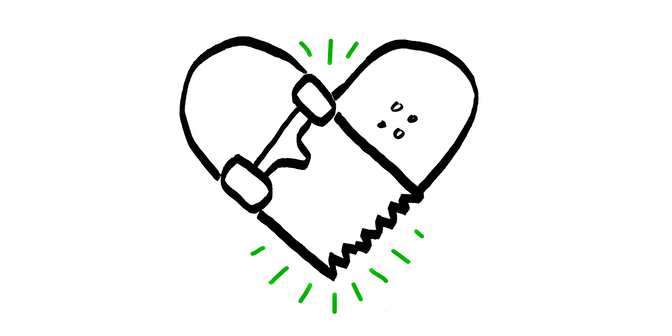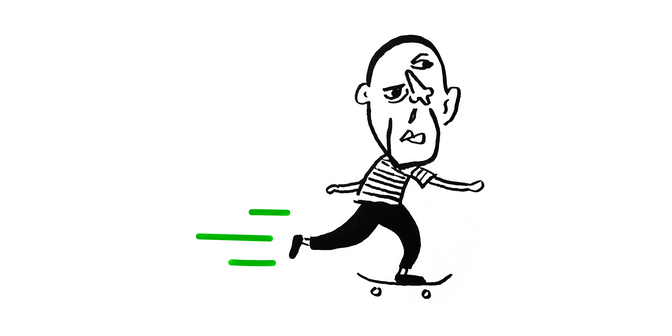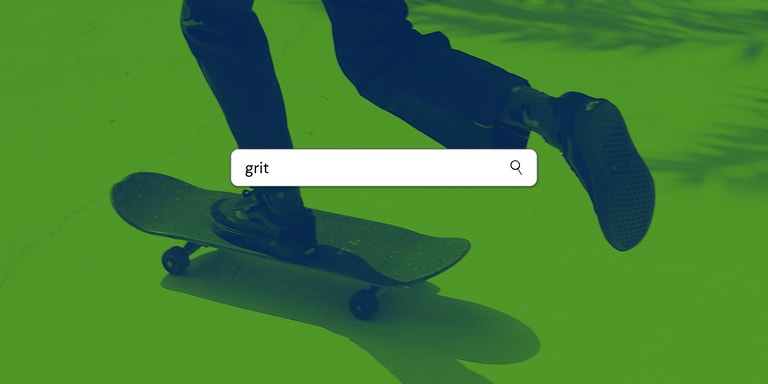How skateboarding made me a better designer
My name is Merlin. I'm a senior digital designer & UX expert. I want to tell you the story of how skateboarding made me a better designer.
I'm a city kid. I grew up in an area of town covered by concrete. Streets, parking meters and electrical lines were the urban vegetation of my environment. No tennis courts, baseball diamonds or green soccer fields could be found. So, I became a skateboarder.
I learned a lot from my urban environment. But today, I want to share the three lessons that skateboarding taught me about being a designer.
Lesson 1. Determination

It took me about 30 days to learn how to ollie. That is, to make my skateboard jump off the ground. When you're a kid, 30 days is like 30 years. It's like Sisyphus pushing his boulder up that hill to have it roll down either side for eternity.
Learning tenacity.
It takes tremendous will power not to give up after sustained effort with no visible results.
"The definition of insanity is doing the same thing over and over and expecting different results."
- Famous Einstein Quote he never said, but still good.
You must cross a real barrier of disbelief. Find internal confidence that your efforts will equal achievement. When your efforts finally do pay off, it propels you towards the next challenge.
Whether you're stubborn, confident, insane, or all the above, creative endeavours are like skateboarding. They demand an unwavering belief that your efforts will be successful. That, despite all signs of deficiency and feelings of inadequacy.
Have faith in your endeavours. Be tenacious in your efforts. You will achieve your goals.
Lesson 2. Failure

Failure hurts. When you are skateboarding, failure hurts your body. It leaves you bruised, battered and scarred. It's also completely unavoidable if you wish to progress in the sport. When someone says, "I'm good at skateboarding", what they are actually saying is, "I'm good at falling."
Learning to fall.
To land a trick on a skateboard, you have to commit to the attempt. A partial effort will guarantee failure. Total commitment means letting go and becoming completely vulnerable to the possibility of failure. This paradoxically is the only possibility for completing the trick.
The truth is, you are going to fail. In fact, you will fail often. Mistakes, errors, setbacks and all around foolishness will surround your everyday. It is impossible to avoid failure, but plausible to learn from it. Learning and growth are the benefits of failure.
Luckily in design, failure is more of a frustration than a health hazard. Failure can be your guidance counsellor. See failure as your harrowing lighthouse flashing its inconvenient glow towards improvement.
If you can accept failure as normal and valuable, you will develop a growth mindset. Let go. Embrace vulnerability. Commit to your efforts. That is how you get better at falling.
Lesson 3. Artistry

Skateboarding is a form of artistry. As a youth, it was not only fun but an outlet for expressing my identity—Self-expression through imagination and motion.
Learning to see.
I discovered my surroundings with the lens of possibility. I could see things invisible to others. Stairs, benches, curbs, and handrails became opportunities for the unintended. I appreciated the city's potential and noticed details that others ignored.
While I was skateboarding, I was present. The physical act forced me into the moment. It required a deep and singular focus. This focus is also achievable in the creative realm. While creating it is natural to enter a present mental state of flow.
Designers have to explore their imagination. Notice the unseen. Practice deep singular focus and remember to have fun.
Summary
In closing, now you should see skateboarding as less of an annoyance and more of an inspiration. You don't have to be a skateboarder to use these lessons.
Keep these points in mind. Your steadfast and determined efforts will result in achievement. Failure, pain, and foolishness are natural and common states of existence. They promote learning, growth, and resilience. Pay attention, be present in the moment and see through the lens of possibility.
Thanks for listening and remember the things that inspire you.

